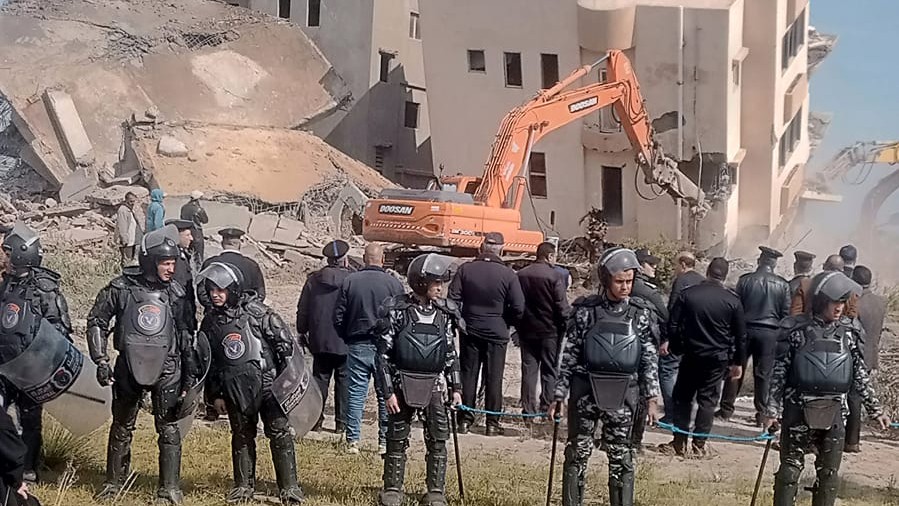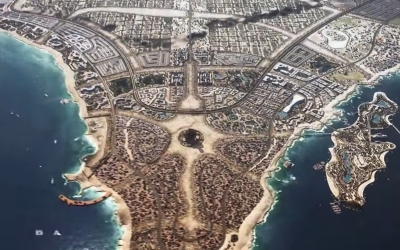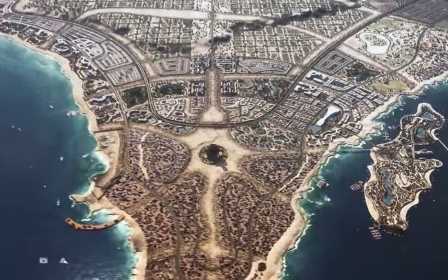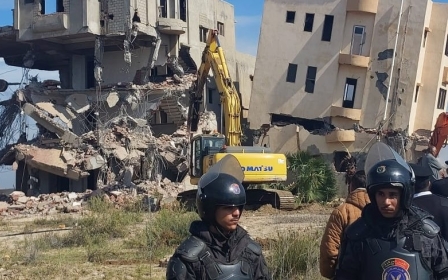How Egypt forcibly evicted this beachfront community to attract investments
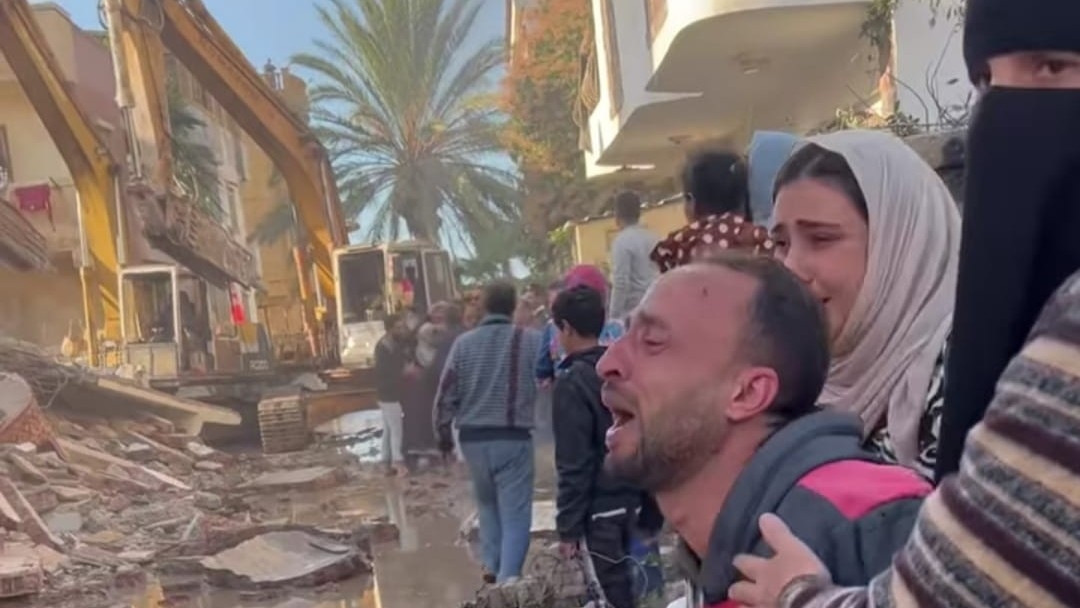
On a sunny spring day in Egypt’s Mediterranean city of Port Said, a woman stood on the top floor of her home, watching as a bulldozer demolished it, balcony by balcony.
“I still cannot believe that I am alive. The house could have collapsed and I would have died,” Ragaa Muharram Ali, a medical scan specialist, told Middle East Eye, a week after a video documenting the incident went viral online.
“But even if I survived, being forcibly evicted from my family’s home is like taking my life away,” she added. On Thursday 14 March, the house was fully demolished.
Ragaa is among hundreds of residents of El-Gameel neighbourhood in Port Said, whose homes have been razed or are slated for imminent removal to pave way for investments on the prime beachfront land.
New MEE newsletter: Jerusalem Dispatch
Sign up to get the latest insights and analysis on Israel-Palestine, alongside Turkey Unpacked and other MEE newsletters
The demolition began in early February and continues unabated as of the time of this report. According to the residents who spoke with MEE, 290 homes were demolished and approximately 25 homes remain, whose owners await the same fate.
The El-Gameel neighbourhood in western Port Said was built in 1978, when the governorate allocated 317 pieces of land located directly on the Mediterranean coast, 10km from the city, to alleviate pressure on other overpopulated parts of the governorate, according to the El-Gameel Environmental Protection and Development Association.
The residents built their homes on the land with their own funds, with permits from the governorate, under a usufruct arrangement. They also collaborated to introduce facilities at their own expense without government support, according to three residents who spoke to MEE.
Egyptian authorities could be seen demolishing a house while a woman is still on the balcony, in Al-Gameel Neighborhood, in Port Said.
— Middle East Eye (@MiddleEastEye) March 8, 2024
The Port Said municipality decided to reclaim the land and demolish the houses as part of an investment plan. pic.twitter.com/CVlA4BnkBi
Usufruct is the legal right to use property temporarily and to keep any profit made from it, widely used in some developing countries.
The situation remained stable for about four decades, until 2019, when the governorate of Port Said announced the end of the land lease on its part and refused to receive the fixed annual payments from the residents for the units, saying they were much lower than the land's current value.
Port Said governor Adel el-Ghadban, labelled the neighbourhood as "a slum", and said the demolitions are part of plans to make the city slum-free and to develop the western part of Port Said.
"It is our right to develop this area, not for our own benefit, but for you and your children," he said during a conference with a number of residents on Monday.
Middle East Eye contacted Ghadban's office for comment on the resident's grievances but has not received a response by the time of publication.
'Unlawful forced evictions'
Rights groups and residents said the decision to terminate the contract was made unilaterally without consultation with the residents.
The Egyptian Commission for Rights and Freedoms (ECRF) said the Urban Planning Authority, tasked by President Abdel Fattah el-Sisi to present alternatives, is "biased" towards the governorate's decision to evict residents.
The demolitions were also carried out despite calls by parliament members to explore alternative solutions.
MEE has obtained copies of three statements by MPs submitted to the government, which request an immediate suspension of demolition activities. They call for thorough consideration of the residents' proposed alternatives, including their expressed willingness to purchase the land at its fair market value.
Maha Ahmed, a human rights lawyer at the ECRF, said the residents of El-Gameel are subjected to “unlawful forced evictions”.
“The government initiated forced eviction operations on 1 February, completely ignoring solutions proposed by the residents for the development of their area,” Ahmed said.
Article 63 of the Egyptian Constitution expressly prohibits any form of forced displacement of citizens, deeming it a criminal offence without a statute of limitations.
"What is currently happening constitutes a violation of a fundamental human right to secure and adequate housing, resulting in the displacement of hundreds of families without providing alternatives,” said Ahmed.
She added that the demolitions are a breach of Egypt's international obligations, including the International Covenant on Economic, Social and Cultural Rights, and General Comment No. 7 of the UN Committee on Economic, Social and Cultural Rights, which specifically addresses Article 11-1 of the Covenant (related to the right to an adequate standard of living, including the right to adequate housing), prohibiting forced eviction operations.
‘My parent’s toil and our memories’
Ragaa’s family home was built by her father in the late 1970s. After his death, she inherited the house along with her four sisters.
Ragaa recounts that her father had to work abroad for years and endured homesickness and loneliness to secure money for his family to build this home, unaware that his daughter would face displacement after four decades.
In December 2020, the Supreme Council for Urban Planning and Development approved declaring the el-Gameel neighbourhood in Port Said as a redevelopment area. This means, according to Article 47 of Urban Planning Law No. 3 of 1982, that properties in that area can be demolished for development and public benefit purposes with compensation provided to their owners and rights holders. This did not happen. No one was compensated.
'The value of the house is not monetary; it’s my parent’s toil and our memories'
- Ragaa Muharram Ali, resident Port Said
Moreover, according to the terms of the usufruct contracts between them and the neighbourhood council administration, the government must compensate them should the contracts be terminated. But no official has offered them any such compensation for their lost homes.
Ragaa, however, said their loss is not simply a matter of financial compensation. "The value of the house is not monetary; it’s my parent’s toil and our memories," she said.
Ragaa and other residents of the neighbourhood have turned to the Egyptian judiciary as a final recourse to secure their rights outlined in the usufruct contracts.
A lawyer representing a number of residents explained that El-Gameel neighbourhood's land was granted on the basis of renewable annual usufruct contracts. However, after four decades of the initial agreement, Port Said Governorate unilaterally terminated these contracts without resident consultation.
They also rejected annual lease payments for units, claiming the neighbourhood had become a slum and required redevelopment.
The lawyer, who spoke on condition of anonymity, stressed that starting demolition without compensation violates civil law, specifically Article 925. They emphasised that as long as the governorate permitted construction and issued licences, the state was obliged to compensate owners.
Several evicted residents told MEE that they filed a lawsuit before the administrative judiciary, but have not received any response from the court yet. They have now taken the case to the Supreme Administrative Court.
Eviction tactics
Residents said the government employed various tactics beyond demolishing homes while residents were still inside to forcibly evict them, including deliberate power and water cuts.
A mother of a three-year-old child in the neighbourhood, who chose to remain anonymous, said her husband was detained for 24 hours to pressure them to leave their home.
"It was a clear message that if we don't vacate willingly, we'll be ousted forcibly,” she said.
“We're aware the house might be demolished but we're holding on to our last moments in this place.”
No official has informed them about any compensation, she said. However, one contractor discussed compensation with them, ranging from EGP 40,000 to 80,000 ($850-$1700). She said the amount was “completely unfair”.
According to another resident, people are lured outside of their homes to speak with local officials, only to have excavators promptly commence demolition upon their departure from their homes.
"They requested us to step out briefly for a conversation, but while we were engaged in dialogue and seeking documentation regarding the demolition and evacuation order, we were shocked to witness excavators tearing down a portion of our villa," the resident who lived in the area for 42 years, told MEE.
The resident, who preferred not to disclose her name, also accused the local authorities of deliberate sabotage of water pipes, causing flooding in the streets, and severely hindering movement.
"The streets have been submerged with water,” she said. Other residents posted videos and photos on their Facebook group showing evidence of the damage.
Ragaa broke down when the bulldozers completely demolished her house on Thursday, 14 March.
“This house was everything we had,” she told MEE. “We love our country, and we wish it hadn't been this harsh on us.”
Middle East Eye delivers independent and unrivalled coverage and analysis of the Middle East, North Africa and beyond. To learn more about republishing this content and the associated fees, please fill out this form. More about MEE can be found here.


